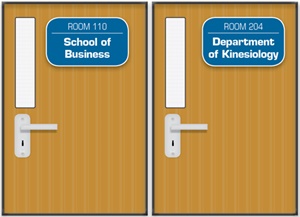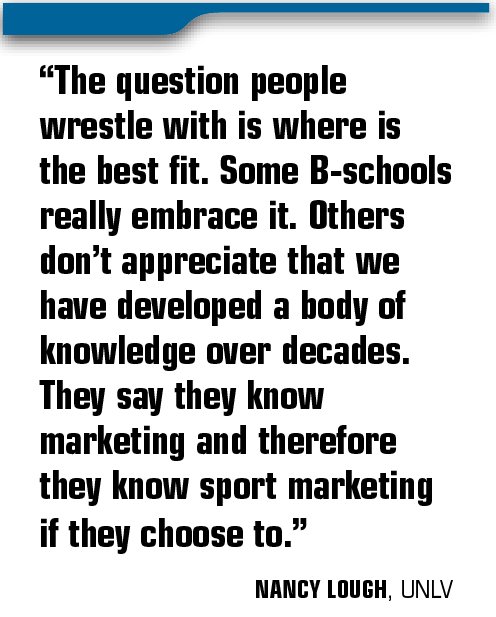Some who study sport also study the study of sport.
It’s called pedagogy — the study of education — and the professors who teach in and administrate sports management programs have been exploring it for nearly as long as their field has been an acknowledged academic path.
While the why, the what and the how all figure into pedagogy, no question has generated as much discussion in recent years as the where.
 |
|
 |
Sports management programs fall under a variety of colleges, which influences the research their professors conduct.
Illustration by Corey Edwards |
Since it incorporates an amalgam of disciplines, a sports management program can be placed in one of several colleges.
It could go in kinesiology or health and human performance, two of the many higher education monikers for phys ed. Physical education branches, which often are tied to a college of education, are where most of the early programs were housed, and where many of the more than 300 U.S. programs still reside.
Or it could go in the business school, which many of today’s sports management educators and administrators see as a more practical fit.
It could even fit within tourism and hospitality management at universities that make that a priority.
While it may seem that the home of a program is mostly semantic, that placement not only can dictate which courses a student must take, it can figure significantly into what sort of research scholars pursue.
“Where they’re housed has an enormous impact on what [professors] study and what sort of pressures they have,” said Janet Fink, a professor in the University of Massachusetts’ nationally known sports management program, which is housed in the business school. “Here, because of our dean, they would consider the Journal of Sport Management our A-list journal, which I think is a very reasonable way of looking at things. But not every dean is going to be like that. The rankings and things like that depend on these hits in A-list journals. If you can get a hit in an A-list B-school journal, that is fantastic and they appreciate it here. But the dean doesn’t require it.”
When Bob Madrigal was an assistant professor at Arizona State and then Ohio State early in his career, much of his research delved into tourism issues, such as the way families made vacation decisions. At Ohio State, he became more interested in sports marketing, and particularly in the psychological drivers that influence fans, even developing a scale that helped explain why people connect to sports as they do.
After moving to the University of Oregon, Madrigal became tenured, which gave him the opportunity to spend more of his research time delving into sports. He has done particularly interesting work examining the role that drama plays in fans’ enjoyment and on the ways brands align themselves with properties through sponsorship.
One of the appeals of Oregon long has been that it is housed in the business school, where it offers students the chance to focus on sports while pursuing a high-caliber MBA. Teaching in such a program was attractive to Madrigal, but it has had an unforeseen impact on his research.
Business school deans at large research institutions, and particularly those at institutions within the prestigious
Association of American Universities, generally are not impressed by publication in a sport-related journal. Because he is tenured, Madrigal could continue to publish there and keep his job. But further promotion was unlikely.
“I was told in explicit terms that to move from associate to full professor, I would need to get things in those A-level journals,” Madrigal said, referring to journals that business schools perceived as A-level, such as the American Marketing Association’s Journal of Marketing. “Given the hurdle of getting sports papers in those journals, it became apparent to me that I was spinning my wheels. That moved me into other research areas that I’m interested in, but they’re peripherally related to sports.”
While a business school may be the more logical fit for a program in the mind of many doing the hiring in sports, not many top-flight business schools have accepted the idea that the marketing and management of sports merits its own specialization within their college.
As long as that’s the case, perhaps it’s better that a program lives where it is valued.
“It belongs in business, but it can’t move there at a lot of places because business schools have their own metrics and journals — and ours don’t match up, frankly,” said Joris Drayer, an associate professor at Temple, where sports management is housed in the department of tourism and hospitality management, allowing for students to take classes in the business school but giving sports management its own administrative structure. “The dean of the business school is going to be obsessed with rankings, which are all about how many faculty members you have and how much they’re publishing.
“We can do meaningful work and publish a lot, but our journals don’t register on their radar at all.”
As director of the sport management program at UNLV, Nancy Lough thought the department fit well into its home in the college of hotel administration, which added the program in 2004, when the city was booming and sports, entertainment, golf management and event management all seemed like fertile ground. UNLV’s hotel school is its bell cow.
But when university budget cuts came three years ago, the dean of the hotel college decided the answer was to go back to basics. Some of the newer majors were absorbed as concentrations, but sports management was cut.
Because she had tenure, Lough was given a year to find another department in which to work. One of her first conversations was with the kinesiology department, which is in the health sciences school.
“When I explained what I did, they didn’t see any fit at all,” Lough said. “They don’t value social science research. Our work isn’t hard science.”
She eventually chose a slot in the college of education’s higher ed department, which allowed her to remain engaged in research involving college athletics.
“Programs can survive and thrive in a college education, but typically in that case you see them housed with kinesiology and that can be a tension-filled experience for young faculty,” Lough said. “How is the research valued? How is it perceived? If we’re housed with science-based colleagues, they often don’t understand our research. In educational psychology, where I am, I’m not too much of an outlier.
“The question people wrestle with is where is the best fit. Some B-schools really embrace it. Others don’t appreciate that we have developed a body of knowledge over decades. They say they know marketing and therefore they know sport marketing if they choose to. That can be a challenge, too.
“So where is the best place to be housed? By and large, you want it where you are going to get the most support.”






